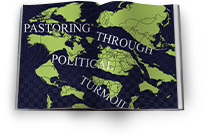How Did Charles Spurgeon Address Contemporary Issues in His Preaching?
One challenge preachers face is figuring out what to preach week after week. This was no different for Charles Haddon Spurgeon, the Prince of Preachers. Speaking to a group of pastors, Spurgeon once said, “All through the week I am on the look-out for material that I can use on the Sabbath.” Spurgeon believed in the providence of God and saw a world full of important lessons for the observant Christian. He encouraged his students, “Always keep your eyes and ears open, and you will hear and see angels. The world is full of sermons—catch them on the wing.” From time to time, this meant preaching sermons that were inspired by contemporary events of the day.
Spurgeon lived during a time of social and political upheaval. Throughout the British empire in the 19th century, there was no shortage of urgent news to lure a preacher’s attention. However, Spurgeon didn’t allow these matters to direct his preaching from week to week. In determining what to preach, Spurgeon was primarily driven by his own study of Scripture and his pastoral sense of his people’s needs. His primary goal in preaching was to open up and apply the Scriptures to his people. As he reminded his students, “Those sermons which expound the exact words of the Holy Spirit are the most useful and the most agreeable to the major part of our congregations.”
But on occasion, contemporary events so affected the life of his congregation that Spurgeon felt compelled to address these events. In these situations, Spurgeon still sought to preach God’s Word, but he particularly sought to apply the Word to the issues of the day. Here in our day, pastors feel similar. We’re confronted weekly with pressing news and events which vie for our attention. In response, pastors often wonder if and how they should address these issues from the pulpit. As we look at Spurgeon, what can we learn?
PREACHING AND POLITICS
Spurgeon generally avoided politics in his sermons. He didn’t believe the pulpit was the place for political commentary or partisan wrangling. In 1873, after several years of publishing his sermons in the Metropolitan Tabernacle Pulpit, he wrote,
Take the eighteen volumes of the Metropolitan Tabernacle Pulpit, and see if you can find eighteen pages of matter which even look towards politics; nay, more, see if there be one solitary sentence concerning politics, which did not, to the preacher’s mind, appear to arise out of his text, or to flow from the natural run of his subject.
Spurgeon criticized the “minister absorbed in politics.” In 1876, he said, “In proportion as the preaching becomes political, and the pastor sinks the spiritual in the temporal, strength is lost, and not gained.” Thus, Spurgeon urged his Pastors’ College students to avoid politics in their sermons. He wanted them to be known for gospel preaching, not political partisanship.
One reason Spurgeon was so opposed to political preaching was because he believed that the world wouldn’t be changed principally through political policy or systemic reform, but through individual regeneration and widespread revival. He said to his congregation near the end of his life: “Great schemes of socialism have been tried and found wanting; let us look to regeneration by the Son of God, and we shall not look in vain.” Clearly, Spurgeon’s approach to social change was largely individualistic and focused on the necessity of the new birth.
We shouldn’t overstate the case: Spurgeon was quite willing to speak to political issues that he believed intersected with biblical concerns. One notable example of this was Spurgeon’s willingness to speak publicly against slavery in America, what he considered “the foulest blot” that ever stained a nation. Though slavery had been abolished for many decades in Britain, Spurgeon knew he had a large American audience and he did not hesitate to condemn the practice when appropriate,[1] even though it led to his sermons being burned in the American South. He also addressed the disestablishment of the state church, injustice for the poor and the oppressed, and certain matters related to British imperialism.
Whether in choosing to speak to political issues or in refraining, the preacher must not forget that he is to be a heavenly ambassador. In an 1873 article, Spurgeon wrote,
For a Christian minister to be an active partisan of Whigs or Tories, busy in canvassing, and eloquent at public meetings for rival factions, would be of ill repute. For the Christian to forget his heavenly citizenship, and occupy himself about the objects of place-hunters, would be degrading to his high calling: but there are points of inevitable contact between the higher and lower spheres, points where politics persist in coming into collision with our faith, and there we shall be traitors both to heaven and earth if we consult our comfort by sinking into the rear.
PREACHING DURING CALAMITIES
Spurgeon pastored his congregation through several significant crises on both a local and national level. In the spring of 1857, a violent revolt arose in the British province of India. By summer, shocking reports flooded back about horrific acts of brutality and murder that were committed on both sides of the conflict. A few years later, in December 1861, the whole Empire was stunned at the news of the sudden and unexpected death of Prince Albert, leaving Queen Victoria grief-stricken and desolate. Her reign would never be the same. Just a month later, a mining tragedy took place in Northumberland which resulted in the deaths of 204 men. In the first decade of his ministry, London was the epicenter of several cholera outbreaks, which also killed many. With the growth of foreign trade and market speculation, a financial panic struck on May 12, 1866. This decimated banks, industries, and the investments of countless of individuals. On these occasions and many others, Spurgeon’s congregation and community were shaken by the reality of suffering, death, and loss. What did he believe to be his duty in such seasons? To proclaim the truth and hope of God’s Word amid the calamities.[2]
So how did Spurgeon preach during these times? Though these sermons addressed the particular crises of the day, he didn’t merely give a topical address on the disaster. Rather, he grounded his message in the Word of God. In picking a sermon text, he looked not only for relevant doctrines, but also for texts with a particular connection to the moment. For example, in response to the cholera breakout of 1866, Spurgeon preached on Amos 3:3–6 in which God warns Israel of the plagues he will bring on them, just as he brought upon the nations. During the revolt in India, amidst a time of national mourning, Spurgeon preached on Jeremiah 9:1 in which the prophet weeps over his people’s suffering and sin. Spurgeon’s belief in the sufficiency of Scripture meant that in each situation, God had a specific word for his people, and it was his job as a preacher to communicate that word.
Spurgeon was also careful to shape his sermon according to the text, rather than drifting off into personal commentary. In his sermon on Jeremiah 9:1, Spurgeon followed Jeremiah’s example in weeping not only over the physical suffering of his people, but also over their moral ruin.
Similarly, on the day after the Great Panic of 1866, Spurgeon preached on Hebrews 12:27, “The removing of those things that are shaken, as of things that are made, that those things which cannot be shaken may remain.” Though everyone had the financial disaster in mind, his first three points dealt with the original context of the passage, namely the passing away of Jewish ceremonial signs for the permanent hope of the gospel. Only in the last two points did he move to the experience of loss. In every circumstance, Spurgeon believed that what people needed most in those times was to see themselves and their troubles in light of the truth of God’s Word. These calamities, along with these sermons, provided an opportunity for them to do just that.
TWO COMMON THEMES
Though each situation presented its unique sorrows and challenges, two themes in particular arose in Spurgeon’s preaching during calamities. First, Spurgeon emphasized the sovereignty of God. In a culture that was growing increasingly scientific and secular, suffering was explained away as simply the natural order of life. Even among Christians, the doctrine of God’s sovereignty was falling out of fashion. But Spurgeon knew that it was one thing to speak about suffering theoretically. It was an entirely different thing to be in the midst of suffering. During times of suffering, abstract theories proved empty and people were longing for a stronger hope. Therefore, Spurgeon didn’t hesitate to point people to the sovereignty of God—not only over blessings, but also over suffering.
Reflecting on the sudden death of Prince Albert, Spurgeon wrote,
Whence came the fever? We could not suppose it to be bred, as the fever frequently is, in our courts and alleys in the plague-nest where filth provided it with all its food, until it was hatched to pestilence. What were its earliest symptoms, what its growth, and how it was that it baffled the physician’s skill? We may lay aside these enquiries, to look apart and away from the second cause, to the first great cause who hath done all. “The Lord hath done it.” He gave the breath, and he hath taken it away.
Far from being a source of fear, Spurgeon understood that the sovereignty of God brought hope for the Christian. He compared the naturalistic worldview to being raised by machines, rather than by a loving parent.
It is as if a child should be left without nurse or parent, but then there is a cradle which works by machinery, and rocks the child so many hours a day; when it is time for the child to wake he is aroused by machinery; there is an engine ready to feed him. . . . When he comes up into life he is still fed by a machine; he sleeps, he goes on his journeys, in everything that he does he seen no living face, he feels no soft hand, he hears no loving tender voice; it is one clever piece of soulless, lifeless mechanism that accomplishes all. Now, I bless God that is not the case with us.
God’s people ought to believe that every calamity has come from God’s wise and sovereign hand. So their response shouldn’t be to complain or rebel, but to humble themselves and to renew their trust and dependence on God.
This leads to the second major theme of Spurgeon’s preaching in calamity: clearly calling people to repentance. Reflecting on Jesus’ words in Luke 13:1–5, Spurgeon believed that in every disaster, the appropriate response wasn’t to try to find its root cause, but to repent, turning away from sin and turning to God in humble dependence. This isn’t to say that we should ignore any practical lessons from the suffering. Spurgeon warned his people against foolish investments after the Great Panic. He reminded his people of the importance of proper hygiene during outbreaks. He spoke against oppressive governmental policies in the colonies. Ultimately, however, his preaching aimed at the individual’s repentance before God. Earthly sufferings only pointed to the greater judgment of God to come. Therefore, all suffering doubled as a warning to repent.
Spurgeon rejected the teaching that specific instances of suffering could be traced to specific sins. Nonetheless, he believed that God brought suffering in order to awaken people to their sin, both individually and corporately. These calamities were God’s holy judgment on the nation for their sins in a general sense, and they afforded the people an opportunity for reflection and repentance. For example, in his sermon during the Indian revolt, Spurgeon didn’t focus primarily on the political issues of the British Empire. Instead, he preached against the drunkenness, licentiousness, and debauchery that characterized every level of English society. On other occasions, Spurgeon condemned the growth of ritualism in the Church of England, rationalism in nonconformist churches, and worldliness among churchgoers.
But in calling out sin, Spurgeon never left people in despair. He pointed them to the Savior. Preaching to a congregation that was wrestling with the frailty of life after the mining disaster, Spurgeon declared,
Sinner, remember thy God shall live. Thou thinkest him nothing now; thou shalt see him then. Thy business now stops the way; the smoke of time dims thy vision; the rough blasts of death shall blow all this away, and thou shalt see clearly revealed to thyself the frowning visage of an angry God. A God in arms, sinner, a God in arms, and no scabbard for his sword; a God in arms, and no shelter for thy soul; a God in arms, and even rocks refusing to cover thee; a God in arms, and the hollow depths of earth denying thee a refuge! Fly, soul! while it is yet time: fly, the cleft in the rock is open now. “Believe in the Lord Jesus Christ, and thou shalt be saved.” “He that believeth and is baptized shall be saved; he that believeth not shall be damned.” Fly, sinner, to the open arms of Jesus! Fly! for he casteth out none that come to him.
CONCLUSION
Outside the pulpit, in his monthly magazine, The Sword and the Trowel, Spurgeon occasionally included articles that addressed contemporary political questions. Even then, his commentary on politics was generally limited to those issues that intersected with religious concerns. Nonetheless, it should be noted that Spurgeon generally believed his monthly magazine to be a more appropriate venue for political commentary. The preaching of the Word of God in the context of the gathered church required a narrower focus for Spurgeon. Preaching was for worship, edification, and evangelism, not for political analysis.
On the other hand, Spurgeon took advantage of widespread interest in current events to promote the preaching of the gospel. Occasionally, this meant taking advantage of holidays, popular trends, and other notable events and working them into his introduction or illustrations in order to connect with his hearers. These connections, however, would only be a small part of the sermon.
The challenge of preaching week-to-week continues for pastors today. What pastors choose not to preach on is just as important as what they choose to preach on. Like Spurgeon, pastors must exercise wisdom and discernment as they plan their preaching. The regular diet of the church should be the faithful exposition of the whole counsel of God. But on some occasions, pastors might consider deviating from their plans in order to give a more extended reflection on contemporary events. On all occasions, however, Christ must be proclaimed, for the salvation of sinners and the comfort of the saints.
* * * * *
FOOTNOTES:
[1] For example, in preaching on “Presumptuous Sins” from Psalm 19:13, Spurgeon writes, “We, despite all that our American friends may say, are the freest people to speak and think in all the world. Though we have not the freedom of beating our slaves to death, or of shooting them if they choose to disobey—though we have not the freedom of hunting men, or the freedom of sucking another man’s blood out of him to make us rich—though we have not the freedom of being worse than devils, which slave-catchers and many slave-holders most certainly are—we have liberty greater than that, liberty against the tyrant mob, as well as against the tyrant king.”
[2] For sermons on the above incidents, see “India’s Ills and England’s Sorrows” (https://www.spurgeon.org/resource-library/sermons/indias-ills-and-englands-sorrows/#flipbook/ ), “The Royal Deathbed” (https://www.spurgeon.org/resource-library/sermons/the-royal-death-bed/#flipbook/), “A Voice from the Hartley Colliery” (https://www.spurgeon.org/resource-library/sermons/a-voice-from-the-hartley-colliery/#flipbook/), “A Lesson from the Great Panic” (https://www.spurgeon.org/resource-library/sermons/a-lesson-from-the-great-panic/#flipbook/), and “The Voice of the Cholera” (https://www.spurgeon.org/resource-library/sermons/the-voice-of-the-cholera/#flipbook/)










